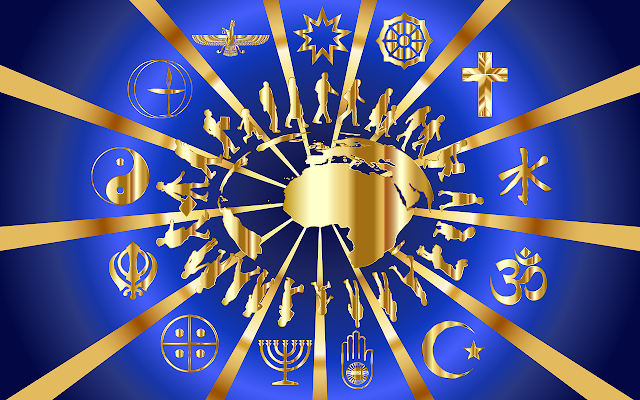The Golden Rule is a primary precept in nearly all major religions. It is also the foundational rule in both veganism and resourceism.
by Michael Corthell
The Golden Rule
The Golden Rule is the principle or precept of treating others as one wants to be treated. It is a precept that is found in most religions and cultures. It can be considered an ethic of reciprocity in some religions, although different religions treat it differently.The maxim may appear in a positive or negative form governing conduct:
- Treat others as you would like others to treat you (positive or directive form)
- Do not treat others in ways that you would not like to be treated (negative or prohibitive form)
- What you wish upon others, you wish upon yourself (empathetic or responsive form)
Moses and Aaron with the Ten Commandments (painting circa 1675 by Aron de Chavez)
The Golden Rule Sums Up The Ten Commandments
- I Am the Lord your God. You shall not have strange gods before me. You shall not make to thyself any graven thing; nor the likeness of anything that is in heaven above, or in the earth beneath, nor of those things that are in the waters under the earth. You shall not adore them nor serve them.
God (or The One/the Universe) is all there is. This commandment is about respect. We respect others because we wish to be respected ourselves. There is only one God, the one who lives within us all. - You shall not take the name of the Lord your God in vain.
This one is about 'crying wolf', that is to say, asking for help when no help is needed or it can also be interpreted as filing a false report. This reflects the Golden Rule because who wants to be lied to or fooled. - Remember to keep holy the Sabbath day.
This command is about gratitude and remembering to thank the other person for doing something for one or for all. Keeping the seventh day holy or sacrificed is a way of giving thanks for creation. - Honor your father and your mother.
This is another command and reminder to respect the persons who take care of us and protect us. If we care and protect others we should also be honored. - You shall not kill.
The big one. Its placement in the center as a type of keystone in an arch is purposeful. All living beings have the desire to live, so following the Golden Rule precludes the murder or the killing of any innocent creature. - You shall not commit adultery.
According to the rule; treat others as you would like others to treat you. People who cheat on their spouses are directly violating it, assuming they don't want it done to them that is. - You shall not steal.
Most don't like things taken from them; possessions, services, ideas, time, or freedom so we don't do it to others if we are following the rule. - You shall not bear false witness against your neighbor.
The most broken commandment. We don't like being lied to but it is safe to say we all do it to varying degrees. When this deception becomes widespread a society can become unstable. - You shall not covet your neighbor’s wife(spouse).
Covet, meaning 'yearn to possess or have.' (stealing) We wouldn't want someone desiring our spouse, so we shouldn't do it either. Fantasizing about another's spouse is akin to the 6th commandment. - You shall not covet your neighbor’s goods.
Thinking about stealing someone else's stuff is not something we want someone thinking of doing to us that's fair to say. The breaking of this commandment has led to nearly all wars and certainly all colonialism. A nation that covets another nation's resources will at least think about going into that country and taking what they want, that is if they have the military power to do so.
The single imperative that sums up all of these commandments is the call to 'love your neighbor, as you love yourself,' which of course is the foundation of the Golden Rule. The simple fact is that if we love a person, be it God or a fellow traveler we are not going to do any of the negative things mentioned above, we are going to practice compassion first and always.
Finally, I would like to say clearly that the Golden Rule is the core precept of both Veganism and Resourceism. Loving the other, whether it be a human being or an animal being is key in having a peaceful, thriving world.
Finally, I would like to say clearly that the Golden Rule is the core precept of both Veganism and Resourceism. Loving the other, whether it be a human being or an animal being is key in having a peaceful, thriving world.
Be sure to watch this video...
________________


Comments
Post a Comment